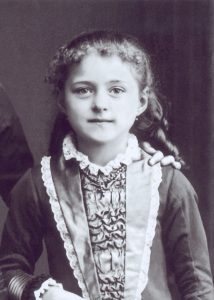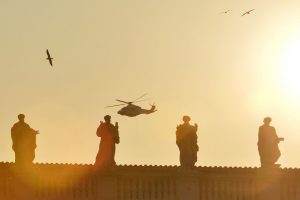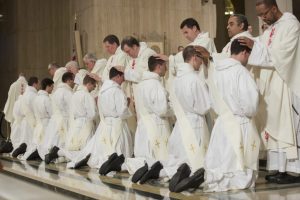Today is the 150th birthday of St. Thérèse of Lisieux.

The saint of the “little way of confidence of love” pledged to spend her heaven doing good on earth. Here are souvenirs of two of her recent missionary journeys.

Catholic musicians gathered to blog about liturgy and life
Today is the 150th birthday of St. Thérèse of Lisieux.

The saint of the “little way of confidence of love” pledged to spend her heaven doing good on earth. Here are souvenirs of two of her recent missionary journeys.

29 August 2006
My spiritual testament
When, at this late hour of my life, I look back on the decades I have wandered through, I see first of all how much reason I have to give thanks. Above all, I thank God Himself, the giver of all good gifts, who has given me life and guided me through all kinds of confusion; who has always picked me up when I began to slip, who has always given me anew the light of his countenance. In retrospect, I see and understand that even the dark and arduous stretches of this path were for my salvation and that He guided me well in those very stretches.
I thank my parents, who gave me life in difficult times and prepared a wonderful home for me with their love, which shines through all my days as a bright light until today. My father’s clear-sighted faith taught us brothers and sisters to believe and stood firm as a guide in the midst of all my scientific knowledge; my mother’s heartfelt piety and great kindness remain a legacy for which I cannot thank her enough. My sister has served me selflessly and full of kind concern for decades; my brother has always paved the way for me with the clear-sightedness of his judgements, with his powerful determination, and with the cheerfulness of his heart; without this ever-new going ahead and going along, I would not have been able to find the right path.
I thank God from the bottom of my heart for the many friends, men and women, whom He has always placed at my side; for the co-workers at all stages of my path; for the teachers and students He has given me. I gratefully entrust them all to His goodness. And I would like to thank the Lord for my beautiful home in the Bavarian foothills of the Alps, in which I was able to see the splendour of the Creator Himself shining through time and again. I thank the people of my homeland for allowing me to experience the beauty of faith time and again. I pray that our country will remain a country of faith and I ask you, dear compatriots, not to let your faith be distracted. Finally, I thank God for all the beauty I was able to experience during the various stages of my journey, but especially in Rome and in Italy, which has become my second home.
I ask for forgiveness from the bottom of my heart from all those whom I have wronged in some way.
What I said earlier of my compatriots, I now say to all who were entrusted to my service in the Church: Stand firm in the faith! Do not be confused! Often it seems as if science – on the one hand, the natural sciences; on the other, historical research (especially the exegesis of the Holy Scriptures) – has irrefutable insights to offer that are contrary to the Catholic faith. I have witnessed from times long past the changes in natural science and have seen how apparent certainties against the faith vanished, proving themselves not to be science but philosophical interpretations only apparently belonging to science – just as, moreover, it is in dialogue with the natural sciences that faith has learned to understand the limits of the scope of its affirmations and thus its own specificity. For 60 years now, I have accompanied the path of theology, especially biblical studies, and have seen seemingly unshakeable theses collapse with the changing generations, which turned out to be mere hypotheses: the liberal generation (Harnack, Jülicher, etc.), the existentialist generation (Bultmann, etc.), the Marxist generation. I have seen, and see, how, out of the tangle of hypotheses, the reasonableness of faith has emerged and is emerging anew. Jesus Christ is truly the Way, the Truth, and the Life – and the Church, in all her shortcomings, is truly His Body.
Finally, I humbly ask: pray for me, so that the Lord may admit me to the eternal dwellings, despite all my sins and shortcomings. For all those entrusted to me, my heartfelt prayer goes out day after day.
Benedictus PP XVI.

Among the many causes worthy of end of the year giving, one of the groups that seems likely to make the greatest difference in this world and the next is the Dominican Province of St. Joseph.
I first became acquainted with the friars in 1999, when two eminent Dominican philosophy professors said Mass at Catholic University’s Campus Ministry–a ministry which the province has just this year taken over as its own. This was just before things began snowballing, as remarkable numbers of young men attracted to the life of prayer, study, community, and preaching flocked to their novitiate. Soon large classes of well-fostered vocations were professing obedience until death and receiving ordination.

To support their vocations boom, the province currently has a matching grant for vocations just till the end of 2022.
It would be impossible to mention all the great initiatives that members of the province have accomplished over the years. Their preaching has a truly international reach, with an East African Vicariate and academic/administrative presence outside the province in Jerusalem, Rome, and California. This personal leadership presence is in addition to the astonishingly creative range of online ministries that spread the Gospel to every corner of the world.
Meanwhile the friars’ on-the-ground ministries closer to home include parish life, academic and pastoral support of Dominican nuns, sisters, and third orders, chaplaincies of all kinds, and countless others, including liturgical music.
I’ll post a few media items below the fold that give just a hint of what our support for these friars through their years of formation can bring to the Church and the world.
For I know well the spring that flows and runs,
although it is night.
That eternal spring is hidden,
for I know well where it has its
rise,
although it is night.
I do not know its origin, nor has it one,
but I know that every origin has come from it,
although it is night.
I know that nothing else is so beautiful,
and that the heavens and the earth drink there,
although it is night.
I know well that it is bottomless
and no one is able to cross it,
although it is night.
Its clarity is never darkened,
and I know that every light has
come from it,
although it is night.
I know that its streams are so brimming
they water the lands of hell, the heavens, and earth,
although it is night.
I know well the stream that flows from this spring
is mighty in compass and power,
although it is night.
I know the stream proceeding from these two,
that neither of them in fact precedes it,
although it is night.
This eternal spring is hidden
in this living bread for our life’s sake,
although it is night.
It is here calling out to creatures;
and they satisfy their thirst, although in darkness,
because it is night.
This living spring that I long for,
I see in this bread of life,
although it is night.
Saint John of the Cross
Translators: Kieran Kavanaugh & Otilio Rodriguez
The hard-working folks at Source and Summit have been producing a moving video series of stories, recounting the renewal of parishes through beautiful sacred liturgies.
This is my translation of a 15th century hymn to St. Francis, In caelesti collegio.
The hymn points out St. Francis’ resemblances to Jesus Christ and to groups of His saints, showing how he belongs among them: apostles, martyrs, confessors, virgins, and angels.
St. Francis shines in glorious light
Among the heav’nly college bright,
For by a grace of special kind
Christ’s marks are on St. Francis signed.
He lived with friends in poverty,
An apostolic company,
And bears the cross that signals peace,
The covenant that shall not cease.
A martyr by desire, he bears
The cross of Christ, whose sign he wears,
So in the heav’ns Christ makes him be
One with the martyr’s company.
He always bore the cross of Christ.
Through abstinence he sacrificed.
So with confessors now he reigns
And with them their reward he gains.
In gleaming robes as white as snow
He follows where Christ’s footsteps go,
And joys in chastity’s great prize
In angel choirs above the skies.
O Father, Son, and Spirit, by
The wounds of Francis purify
Your servants who these gifts implore
Forever and forevermore.